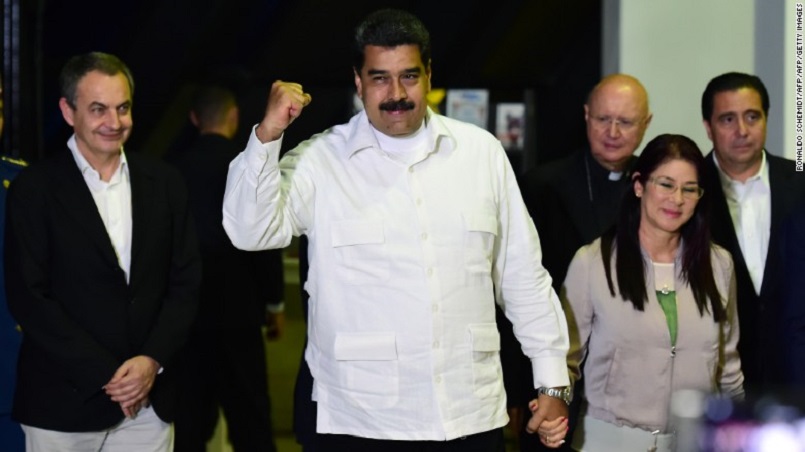
Venezuelan President Nicolas Maduro and his political foes are making progress on getting the country back on track, with some help from a group of international mediators.
The Venezuelan government and the Democratic Unity Board, the political coalition that includes several opposition parties, sat down Sunday in a long-overdue attempt to find areas of compromise for the beleaguered Latin American country.
The president, who has overseen one of the worst recessions in living memory, engaged in talks with his political opponents for the first time in over two years. During that time, several bipartisan subcommittees were created.
Meeting for the first time since April 2014, Maduro shook hands with Jesus Torrealba, secretary general of the Democratic Unity Board (MUD). The meeting was facilitated by the Vatican, among other parties.
"The only alternative is dialogue," Maduro said before the talks began. "We have come prepared to listen and hopefully to be heard and to find topics of agreement for the interests of the majority of the country. I think it isn't the time for long speeches but rather to assume a deep commitment."
He continued, "I assume the deepest commitment to this process of dialogue that kicks off today. I thank the MUD for being here and I hope we will make the best, and greatest efforts to advance gradually and steadily."
Bipartisan working groups formed
During Sunday's talks the parties agreed to set up several task forces to address some of the country's biggest issues, including the economy, human rights and electoral matters.
These subcommittees will be led by independent observers and will be made up by members of the opposition and the government.
Rhetoric to be 'toned down'
The talks, which lasted well into Sunday night and Monday morning, took place in Caracas. They were originally planned to be held on an island off the coast of Venezuela, Margarita Island, but were relocated to the capital at the request of the opposition.
The two sides have agreed to "tone down" the political rhetoric and anger against each other.
Torrealba said that his coalition intended to "fight for the Venezuelan people." He also said he attended the meeting with Maduro because of the Vatican's invitation.
"We talked about the hunger, we talked about the lack of medicine, we talked about the urgent necessity of a humanitarian channel to help solve the drama of the Venezuelan people," he said.
One prominent Maduro opponent, Voluntad Popular (Popular Will), declined to attend, saying that the government has "not improved the conditions to start a true dialogue," and will push ahead with its plan to start an impeachment trial for the embattled president.
International moderation
The meeting was attended by designated mediators, including Papal envoy Monsignor Claudio Maria Celli, former Colombian President and UNASUR (Union of South American Nations) Secretary General Ernesto Samper, and former heads of state and government from Panama, the Dominican Republic and Spain.
Celli said that the Pope was monitoring Venezuela's situation carefully.
"We know that peace is Pope Francis' main worry, peace for all people," he said.
He added that peace cannot be achieved through violence.
"There is always another solution. Violence only creates more violence. Today we need to find paths, that although hard, will lead to lasting peace," he said.
The US State Department announced on Monday it will send diplomat Thomas Shannon to Caracas to demonstrate "support for the ongoing dialogue process." Shannon will stay through Wednesday to meet with senior officials and other leaders.
The parties will meet again on November 11.
